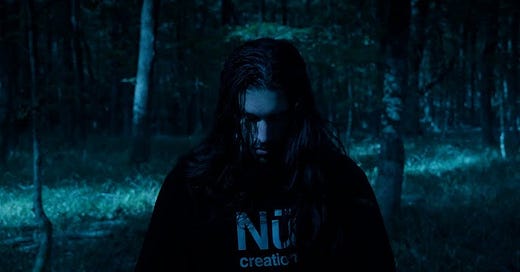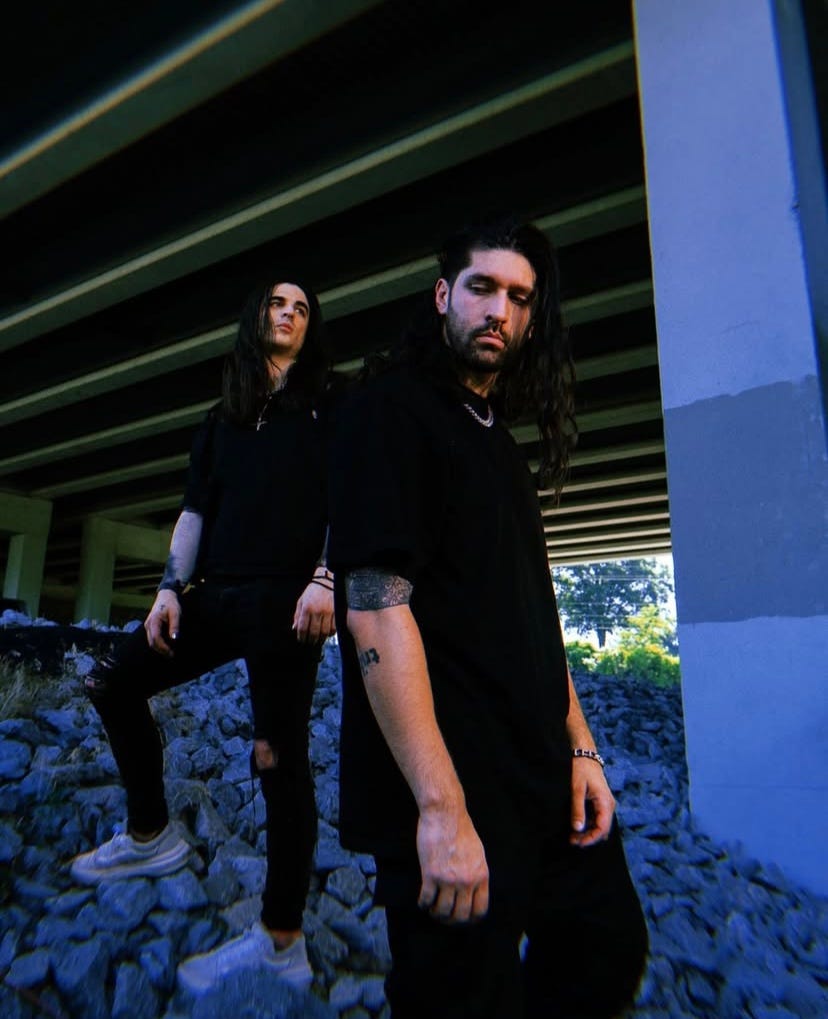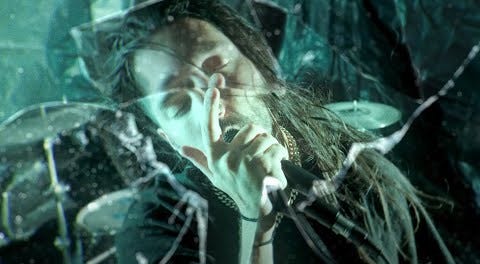With a few songs out and a handful of performances under their belt, rock band bødyWash. is already starting to make waves. The 2-man project was started by drummer David Abbott and vocalist Mogli the Iceburg. We’ll let you tell you about it themselves!
This is part 1 of our interview with bødyWash.. Stay tuned for part 2!
This article originally appeared in Midnight Donuts #5 from October 2024. Want to read the most recent edition of Midnight Donuts? You can do so here!
Midnight Donuts: Who is bødyWash.? If you were at a block party or something, how would you answer that question?
Mogli the Iceburg: I always like to tell people it's like a nu metal revival project. Basically, we're making heavy music that is as heavy as you can get without scaring girls.
David Abbott: [Laughs] Yeah, that's a really good way of putting it.
I grew up—and I know [Mogli] also kind of in that vein—listening to metal as kind of your creative and emotional output in a lot of ways. So, we're trying to bring that into focus, but in a digestible way where we can go play any type of a show, rather than just a specific subcategory of a subcategory. … Finding ways to kind of take that isolated sound and upscale it to a broader audience that appreciates heavy music, that appreciates the aggression and the tonality and enjoys that type of experience. Without being gatekeep-y in the sound and shutting the doors to some of the people who are not as ingrained in that subculture.
… We're not reinventing the wheel here. We're just rediscovering what we already know.
Midnight Donuts: Did you guys grow up listening to a lot of metal, or did you discover that later?
Mogli the Iceburg: For me it was definitely always a big part—growing up, I would always oscillate between metal and hard rock and hip-hop. There'd be years where I would be super down into metal and alternative stuff, then I'd take a break and be really heavy into hip-hop for a couple of years.
But yeah, it's always been a part. My dad loved heavy music. So that was always him introducing me to stuff. I think that that shaped my predispositions a lot.
David Abbott: Same for me, too. Funny enough, Linkin Park was actually the first time I heard screaming [on a song]. I was super young at this point, probably like 7 or 8. I remember hating it at first, but then when I got to 13 or 12—since then it's been the majority of the music I listen to.
I always kind of season it up [by] throwing in some different genres in there, but it's mainly been metal for me the whole time.
Mogli the Iceburg: What was interesting with me, too, is that I got a lot of my hip-hop influences early on from nu metal as well. Because—especially for me—growing up, rap was seen as something that was a very black genre. And I'm not black.
So then it's like, “OK, well, there's Eminem…” And he's just this bundle of crazy horrorcore controversy, so I thought I could never identify with him. But who I could identify with [was] the singer from P.O.D., who is Hispanic like me. I could identify with Mike Shinoda from Linkin Park.
Especially at the time, some of those artists were being very emotionally transparent in hip-hop before that was the popular thing to do. Because this was a time when 50 Cent was the juggernaut of rap, so everything is super gangster rap, super hard. You're hardcore, everybody's been shot, everybody's a drug dealer.
And then Mike Shinoda is rapping about his feelings. Before Kanye was rocking a pink polo, before Drake was on the scene.
So, I think it's interesting [how] some of the aspects of the hip-hop fusion from some of that metal was very ahead of its time.
Midnight Donuts: How would you define “nu metal?” Because that's something I feel like I only recently have a grasp on, because I didn't grow up with that kind of thing.
David Abbott: It's a niche term, but it can also be applied to many things. … It has a lot of applications, but basically the nu metal fusion between what you would think of as “metal” and then grunge coming together. And then sprinkle in rap…
Mogli the Iceburg: …Industrial music, electronic music…
David Abbott: Yeah. All of it together.
Mogli the Iceburg: To me, the spirit of modern nu metal is taking lots of genre influences and making it heavy and making it new.
I see nu metal as—basically you're taking pop structures, you're making them heavy, and you're blending a bunch of influences. And that's very much also where emo rap and a lot of hip-hop trends have come from. So, I think there's a lot of overlap with some of those subcultures.
It's keeping the spirit of innovation. And that's the thing, for us: we see rock music right now, and the thing that stinks is a lot of the personalities aren't there anymore. A lot of the innovation and the culture isn't there anymore. That's part of the reason why rock has struggled so long. It's like a bunch of dudes that don't get out and talk to people making music for their friends on the internet and not attempting to interact and have a conversation with culture.
And then all the charismatic people—if you're a charismatic, innovative kid wanting to make music in 2024, you're probably going to make hip-hop, or ... hyperpop, or something like that. So, it's trying to actually bring some of the personality and some of the things that make art remarkable back into that.
David Abbott: To answer that question, we could go back and argue about what exactly defines nu metal, but for us—like [Mogli] just said—it's going to be bringing in the kind of flavor of those identifiers of nu metal in the late 90s / early 2000s, and then adding onto that. Because that genre as a whole hasn't gone through a series of iterations over the past 20 years. It got to the early 2000s and then just kind of slipped off an edge.
So, bringing back those identifiers and then modernizing it with what we know now, and then adding in what we think is coming up and doing really well and what we enjoy listening to today.
Midnight Donuts: I love that. It's more of an ethos of innovation than it is a specific time capsule. Which I think is cool because you see a lot of people trying to do a rock band as a nostalgia trip or something. There are a lot of bands that are kind of trying to get that nostalgia factor, but for y'all it sounds like you're looking backward in order to look forward, not just to look back.
Mogli the Iceburg: On socials and stuff we play with Y2K nostalgia and stuff like that. Part of that is just because it's effective. [Laughs] This is a new project and the biggest thing we’re trying to communicate to people is that, “Hey, that type of music that you used to like? People are trying to do that now.”
There's music that's to get the wheels rolling before we really start to take crazy risks. Because some of the demos that we have already for bødyWash. are crazy—like blending cloud rap and lofi stuff and shoegaze and also finding a way to like rap over that.
But [right now] we're trying to cover the basics, establish a base and, you know, get crazy from there.
David Abbott: We want someone who likes what nu metal was to enjoy what we have now. But we also want people who enjoy the more modern type of metal and more modern hip-hop influences to be able to be like, “I don't know what nu metal is,” listen to us, and then be like, “OK, that makes sense.”
Midnight Donuts: Where did the name of the band come from?
Mogli the Iceburg: Dude, we were going through a bunch of different names—I do a lot of my deep thinking in the shower—and I just looked at my body wash and I was like, “man, if you take the connotation of soap out of that, those two words are kind of crazy.”
So, it is whatever you want it to be. But “body” is a heavy freaking word. You can imply “death” with body, you can imply somebody's body count with body, you can imply “self” with body.
And then “wash”—we love incorporating ambient stuff, reverby stuff. So, there's this soundscape word that's attached to “wash.”
“Body wash” together: there's a sense of renewal. There's a spiritual component with that.
It's also just a common word. … People can project whatever they're feeling in the music onto the name and establish their own connections with it.
David Abbott: But to give us a concise, straight answer: it is sonic wash, it could be spiritual wash, it could be some sort of rebirth wash. But whatever that transformative process is, that's what we're trying to deliver.
We see into it our own meanings, but we don't want to tell people exactly how that affects us because we want people to be able to see themselves.
Mogli the Iceburg: And I think that leans into the faith component. Because … Christian rock was so much bigger than people give it credit for. Most people don't know this, but to this day the band Thousand Foot Krutch—a pretty niche Christian nu metal band—they consistently out-stream Lecrae, even though they haven't dropped in like 10 years.
So, there's something with the format of rock music that allows different messages to prosper in a way that is more challenging from a hip-hop perspective, where everything is very personal, everything is very biographical, everything is spelled out for you. Whereas you can make a rock song and the lyrics can be a little bit more ambiguous. The lyrics can be a little bit more metaphorical. That leaves room for people to connect so many different things.
I think that's a really cool opportunity for us to create as Christians and as believers that have broad stories and wide sets of emotions that we want to communicate. There's always an angle to incorporate that and at the same time leave it up to the listener.
Like, one of our songs—“rewind”—I had a very specific reference from my life … inspiring those lyrics. But I don't even want to give too much detail about that because I want people to be able to listen to it and whatever it is that connects to their life, I want them to make that connection.
Midnight Donuts: What's next for bødyWash. the band?
Mogli the Iceburg: We have a bunch of music that is in various stages of production and close to finished. I'm becoming a dad this January!
Midnight Donuts: Congratulations!
Mogli the Iceburg: I'm trying to get as much metal out before my daughter comes.
I think, almost certainly, unless something goes wrong or haywire with our schedules, we're going to have something out by the time this comes out. By mid-October we'll have another single drop, and then we're expecting to have singles drop every 4-6 weeks, something in that ballpark. We're not sure, but we're going to make sure we have a steady stream of music coming out as we define what this is going to be.
It'll be a progression—we're not just going to suddenly drop a 10-song album. … It'll be a larger progression of singles and we'll see what it looks like next year.







